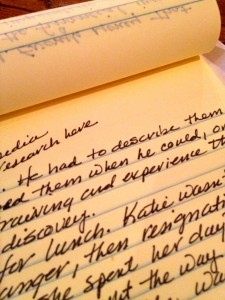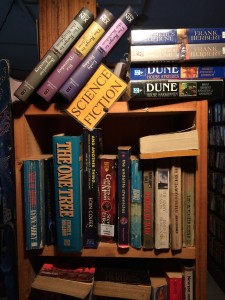

Current Hearts of Tabat wordcount: 85264
Total word count for the week: 10022
Total word count for this retreat: 10022
Worked on Hearts of Tabat, Christmas story for anthology (“My Name is Scrooge”)
Time spent on SFWA email, discussion boards, other stuff: 10 minutes, but I’ll give it an hour this evening
Other stuff: prep for Saturday’s class
Steps: 10410
Excerpt from today’s work, part of Hearts of Tabat:
At the head of the Tumbril Stair is a landing, stone-bannistered, which overlooks all of the city. From that central point, one can look right and see the Duke’s castle far atop the cliffs overlooking the city, and then fifteen terraces down, shelf after shelf, flat lines broken by avenues of flowering trees and other staircases small and large and immediately at hand the oily black iron lines of the Great Tram with its basket cars swinging up and down, laden with those who had the pennies to spend on such transport.
At the edge of the water lies the Winter Garden and then the bay. Retreat inward a little, and the gaze encounters the docks and warehouses that are the center of the city’s industry. Keep traveling leftward for more shelves, and the great clots of smoke that mark the Slumpers, and then the salt-marshes, planted thick with purple and green reeds, a single channel leading through them to allow ships to come down from the Northstretch river and reach the sea.
The five terraces closest to the water were the saltwater neighborhoods; above them lay the freshwater. In Tabat, one distinguished between saltwater and freshwater, from matters such as foodstuffs to professions (for pilots it was the most important distinction, and the most bitterly fought). Even the markets were separated by that division, with the Saltmarket hosting only wares that knew the sea’s touch: dried fish for chal (which always must be made with salt fish), and bushels of seaweed, dried and fresh, smelling tangy sharp and green, and the woven reed-ware “” baskets and hats, parasols and stiff caplets, tight woven and rain-repellent “” that everyone wore once the summer heat started, until time to burn them in autumn’s bonfires.Saltwater tailors dealt with fabrics from elsewhere “” silks and petals from the Rose Kingdom, cheap bright cottons from the Southern Isles “” and freshwater with homegrown, wools and flaxy linens, stiff and glossy but prone to wrinkling and expensive to maintain.
The Nittlescents were saltwater merchants, their house built on trade, perfumes and attars. Adelina had done her turns in the manufacturing side of the house, but her nose was not keen enough to be a perfumer, and she preferred the numbered side of things, the flow of revenue and payments that was the ledger reflection of that industry.
...

To keep myself honest, I’ll be posting word count and WIP excerpts.
So, yesterday:
Word count – 5k
Hearts of Tabat current word count – 82184
SFWA time – hour and a half on call plus e-mail plus skim thru discussion boards
From Hearts of Tabat, an early chapter, still in rough draft form.
This is what a riot looked like. Pink velvet darkened to plum by spilled punch, and flickers of angry firelight glistening on the sticky surface. Two shattered windows, broken glass spiderwbs in reverse, light from the aetheric lamps hanging over the street outside washing in, acitinic blue white over the parquet floor that had been Benarda’s pride, two hundred and thirty different kinds of wood, each dedicated to a different Trade God, zebra-striped bits of southern wood like dappled petals around her boots, as though she trod on clots of dirt-streaked snow, chips of mammoth ivory salting the petals in tiny white freckles.
A punch bowl, shattered by the first brick that had come in, landing soundly in the middle beside the overturned table, sending punch and bits of curved luster-glass everywhere, a great puddle of liquid changing the colors of the woods beneath them, tinting them dark and rose.
Two paintings askew on the walls, others lying on the floor in a jumble that drew the eye as much as their subject matter, impious and arresting, the torches that had set the rioters outside afire. Someone must have known what the paintings would be like, must have tipped people off, organized the crowd.
There. Marta’s eyes, glittering hate at Adelina across the room. Gods, even now the woman would rather hold her grudge against Bella rather than worry about keeping herself alive.
This is what a riot sounded like: angry shouts coming in through the windows, drowning out the frightened whispers all around Adelina (“Was that Bella Kanto who just went out? Of course I knew she’d be here.) Benarda somewhere behind the scenes, ordering someone else to do something, it was unclear what. The woman’s best chances of keeping her gallery further intact had just walked out the door in order to stand down the crowd, which had grown from the few dozen that had been here when she and Bella had first arrived, immediately after the now-absent Duke’s speech
This is what a riot smelled like: smoke and sweat and alcohol and all the mingled pomades and perfumes ““ who was still wearing vetiver, that went out last season? And what was that intriguing cinnamon and musk blend, was that an actual edge of rum in it or some remnant of the punch?
That was what a riot felt like: Leona’s small fingers in Adelina’s own, Bella’s tiny cousin and the center of all this clamor breathing hard, the gasps and gulps of air she took in when stressed.
Adelina’s own pulse beat fists against the hollow of her throat, pressed tight fingers behind her brows every time the streetlight struck her eyes, hammered at the pit of her belly, unnerving her.
...

A short story is smaller, flatter, closer to two-dimensional, while a novel has at least four dimensions and probably much more than that. Things interconnect in a short story, but in a novel those interconnections become even more important, indeed are their own kind of building block. In a novel, things reflect, are doubled, made more complicated, imbued with meaning. So what’s the difference beyond that? For me, it’s what’s required in the writing, in getting enough of the book in my head to be able to figure out where it’s going next.
How does one achieve that? The answer that’s emerged for me is submersion. There needs to be — at least for me — a period where I’m focused on the writing to the exclusion of anything and everything else. To go to sleep with my words echoing in my head, to wake with dreams lingering in which pieces of the story have been predicted or deciphered. To not be watching television or playing videogames, which fills up my head with pop culture crap (I do not decry it in its place, simply claim that for a writer, too much can be detrimental.)
To work at novel length — at any length, really, though — is a willingness to let your unconscious wander and then capitalize in the rewrite on the wonderful things that process has revealed. You can’t hold a novel in your head the way you can contain a story, seeing it as a complete entity. Instead you exist within it, seeing outward, creating a hollow space in which the reader can live while experiencing the funhouse ride you have constructed.
I start with a roadmap that tells me the basic arc, but every few chapters I have to recalculate and check that map, and make sure no necessary sidetrips have presented themselves (or need to be dropped from the itinerary). I know by now, having completed five of these things, that I can reach the end. I just don’t know exactly how much gas it’ll take or what the terrain will present me with. That’s half the joy and most of the terror of this enterprise.
I don’t want to discount writers with a more straightforward plotting process — mileage will always, inevitably, vary and anyone who claims to have found the One True Way for anyone other than themself is full of hooey. Here’s a truth: all that matters is that you write. That you produce words of fiction rather than words about the art of fiction writing or the state of the world or the publishing industry or any of the ways in which the world has wronged you (a fascinating topic to you, but few others). This is not to say that critique and revision are not important as well, but simply that for either to take place, the act of creation must have preceded it.
I’m counting down the days till July because I’m taking a month and a half for submerging myself, heading off to housesit for a friend in another state. It’s what both my waking and unconscious mind are telling me to do in order to finish up this book and get a running start on the next, Exiles of Tabat. To dive deep into the roots of the story and blunder around, colliding with those hidden pillars, overgrown with metaphor and symbology, so semiotically-shagged that you must reach out for them with something like a special bat-sense, akin to sonar, because otherwise you’re just a blind man, holding onto an elephant’s tail and gravely expounding on how like a snake an elephant truly is.
Those pillars inform everything because they hold it all up. A story is just a story, a spaceship just a spaceship… but that’s not true at all, is it? In a novel, a spaceship’s cargo hold is packed tight with meaning: exploration, escape, the forces of technology, even fripperies like references to other fictional spaceships or science.
Things in books are more than just things, because even when we’re reading “just for entertainment,” there’s a level on which they show us what is and isn’t okay for humans to do. Everything is political in that it works to normalize (or mark as abnormal) what’s presented in it. A book with a protagonist preaching libertarian values or fondling her gun is just as political as any other viewpoint and to pretend such stories are not political is disingenuous or ignorant at best and outright dishonest at its worst.
But I digress, because I don’t want to talk about opinions of art, but rather what I can say about its creation. I’ll have wireless, so I’ll be teaching some classes, and there’s a few other things to do, but mainly I’m just going to write and write and see what I can get done. The book for sure, and a handful of stories that I’ve promised people, and at least an outline for Exiles. I am extremely lucky to have a spouse who doesn’t mind my heading off to hole up, as well as the economic circumstances to do this, and I am going to make the most of it, particularly in the post-Nebulas lull, because I’m itching to get the second book out there and see what people think, because it’s a weird structure, and man, the people who didn’t like the cliffhanger in the last are not going to be happy with this one.
Life’s been contentious lately, at least in the overall climate. If you want to feel happier, go do something nice for someone else. Give someone a kind word or a smile. And wish me luck, because today’s got a series of downers in it – but they are all quite survivable and July is coming soon.
...

But sometimes bad stuff happens. Sometimes you’re dealing with a loved one’s illness, or your own, or a natural disaster, or something else, because the world is one filled with tragedies, large and small.
Earlier this year a relative was diagnosed with cancer. It wasn’t the first time ““ she’d had a bout five years ago ““ but this time there were a lot of words that were ominous, including chemotherapy.
And so, last month, this month, the next few months I’m working at getting my first novel launched and worrying desperately about its reception and writing the second one, and at the same time, trying to give her the support she needs. I take my laptop to the hospital, where they have excellent wireless, and I keep picking away at things.
I have always have a healthy sense (some might say too healthy) of humor and a disinclination towards taking myself seriously. Both have stood me in good stead here, but I can tell I’m stressed, nonetheless. I find myself, more than anything, filled with surges of anger at time. At the world, at cancer, even at my poor relative. I find myself sometimes lost, sometimes doing things unlike myself, or even irrational or forgetful, a thing that scares me, because my grandmother had Alzheimer’s, and that’s always been one of my secret fears. Other times I find myself sad and lonely and so full of self-pity it oozes out of my ears in a most unbecoming way.
There’s other stuff going on, and I don’t want to talk about it because it’s matters that are private for other people. But I can tell you this, from the heart of anger and sorrow and a life that is currently chaotic, it is still ““ for me ““ possible to write and what’s more, to take parts of what’s going on and make it into stories. And it helps. It helps you make sense of it. It helps you achieve distance.
We go to stories to find out what to do. How to be human. What we can expect and what’s expected of us in turn. If you have something to say about that, then write a story about it. That’s worth a thousand angry or preachy blog posts, in my opinion. If you don’t like the art someone is creating, don’t worry about theirs but go and make your own.
Go sing your song, and if you do, the universe will sing through you. And that, my loves, is the best sustenance for the battered and beleaguered soul that I know of.
...
 Recently, Ryan Boudinot wrote an essay for The Stranger titled “Things I Can Say About MFA Writing Programs Now That I No Longer Teach in One“. Among other things, he observed:
Recently, Ryan Boudinot wrote an essay for The Stranger titled “Things I Can Say About MFA Writing Programs Now That I No Longer Teach in One“. Among other things, he observed:
Either you have a propensity for creative expression or you don’t. Some people have more talent than others. That’s not to say that someone with minimal talent can’t work her ass off and maximize it and write something great, or that a writer born with great talent can’t squander it. It’s simply that writers are not all born equal. The MFA student who is the Real Deal is exceedingly rare, and nothing excites a faculty adviser more than discovering one. I can count my Real Deal students on one hand, with fingers to spare.
This is, in my opinion, wrong-headed, elitist, and insulting. Other people have replied eloquently. Chuck Wendig said:
This is one of the worst, most toxic memes that exists when it comes to writers. That somehow, we slide out of the womb with a fountain pen in our mucus-slick hands, a bestseller gleam in our rheumy eyes. We like to believe in talent, as if it’s a definable thing “” as if, like with the retconned Jedi, we can just take a blood test and look for literary Midichlorians to chart your authorial potential. Is talent real? Some genetic quirk that makes us good at one thing, bad at another? Don’t know, don’t care.
...
 All taken from http://www.helpineedhelp.com/#/
All taken from http://www.helpineedhelp.com/#/
Enjoy these story prompts and want more content like this? Check out the classes Cat gives via the Rambo Academy for Wayward Writers, which offers both on-demand and live online writing classes for fantasy and science fiction writers from Cat and other authors, including Ann Leckie, Seanan McGuire, Fran Wilde and other talents! All classes include three free slots.
Prefer to opt for weekly interaction, advice, opportunities to ask questions, and access to the Chez Rambo Discord community and critique group? Check out Cat’s Patreon. Or sample her writing here.
...

You may not be creating publishable words. You may not be creating amazing words. You may not be creating words you like. But by creating words, you are doing something actual, tangible, verifiable. And that puts you ahead of all the people who aren’t writing.
Someone once said to me at a party, “I would write, but I need to conquer some inner demons first.” And honestly — in my opinion, that’s bullshit unless he was talking about the inner demon of procrastination and not just being a pretentious jackass. Because, come on – who says that kind of thing and takes themself seriously?
Writers just fucking write.
Do you need to send stuff out? Do you need to polish what you’ve produced? Do you need to promote your writing? Yes, and yes, and yes, but all of those things are dependent on having written.
Let me reiterate this, because it’s important. Writing always comes first.
When I teach, we do a lot of writing exercises. And I hear people say, just before they read what they’ve produced, “I’m not sure I did this right.” And then they go on and read me something wonderful. Maybe it’s not exactly what I was envisioning when I came up with the exercise. Maybe they’ve turned the exercise on its head and done something completely different. But that’s okay. The only way they could do the exercise wrong, in my opinion, is to not do it.
I have seen stories workshopped that were…sometimes difficult to say much about. Some are seared on my memory; others kept me up at night trying to figure out what to say. Some were politically a bit problematic. But you know what? At least they got written.
If you are writing, you are being a writer. If you keep at it — and think about writing and getting better — you will get better. There are things you can do that will help you get better faster, but all of them depend on…well, you should know what I’m going to say here by now….writing.
If it’s fear of getting it wrong that’s stopping you, then knock it off. Here’s the reassurance you need. You cannot do it wrong.
Now go write some words.
Enjoy this writing advice and want more content like it? Check out the classes Cat gives via the Rambo Academy for Wayward Writers, which offers both on-demand and live online writing classes for fantasy and science fiction writers from Cat and other authors, including Ann Leckie, Seanan McGuire, Fran Wilde and other talents! All classes include three free slots.
Prefer to opt for weekly interaction, advice, opportunities to ask questions, and access to the Chez Rambo Discord community and critique group? Check out Cat’s Patreon. Or sample her writing here.
...

For example. The last few days I’ve been working at getting back into the flow of writing daily. I held myself accountable and post daily word counts here or on Twitter. And lemme tell you, some of those words were difficult to wrestle out of my skull and onto the page. One way I can tell things are going in difficult fits and spurts is that I’ll hop around a lot from story to story.
One of those projects is “Prairiedog Town” (which is definitely getting a different title). I started jotting down mental notes for it while traveling through Kansas, but only had a thousand words or so on it before last week. It was slow writing, partially because I wasn’t sure how I was getting from one point to another in the story. I knew it was a piece about a woman reclaiming her humanity and I had a good idea of what the penultimate scene would look like.
So I kept jotting words down in sporadic clumps of a few hundred at a time, yerking the story along in an awkward and impatient way. It helped when I incorporated a prompt from Sandra M. Odell, a woman finding an abandoned teddy bear by the road. But it still was slow slogging. Yesterday I took a break from it.
And then, this morning, while working on it, things began to fall into place. A secondary character had popped up, and I understood how to bring her back into the story — and why. A piece that was supposed to take three days suddenly shortened into a single night, and with that, the ultimate scene came clear. I went through, pulling the threads into place as close to a thousand words came spilling out and into the story.
It’s not done yet — maybe another thousand words to go, but I’ve got a map of it, and comments where I need to go back and insert things. Here, for example, is what a section of today’s work looks like:
They end up chatting. Talia asks after father. Relates that he’s died. Talia asks if she’s going to the funeral.
No
It’s what you’d say either way, isn’t it.
That’s true
I’ll be there. On the outskirts.She freezes again. It’s an old code word they used to use, back in the days when they worked together. It’s someplace close but (some distance) to the (direction).
And most importantly at all, things have come together to a point where I’m excited about the story, feel that some clever stuff has been worked in or has had places made for it. It’ll end up being around 4-5 thousand words, and I know I’ll finish it by the end of this month, because it’s designated as the next story to go out in the Patreon campaign.
And if I hadn’t done that picking away at it — scraping those words out of my skull, even though it felt painful and awkward and uninspired — I would have never gotten to that point at all.
Enjoy this writing advice and want more content like it? Check out the classes Cat gives via the Rambo Academy for Wayward Writers, which offers both on-demand and live online writing classes for fantasy and science fiction writers from Cat and other authors, including Ann Leckie, Seanan McGuire, Fran Wilde and other talents! All classes include three free slots.
Prefer to opt for weekly interaction, advice, opportunities to ask questions, and access to the Chez Rambo Discord community and critique group? Check out Cat’s Patreon. Or sample her writing here.
...

I have never been a good swimmer. It’s quite possible I never will be. When I was a kid, my parents kept enrolling me in swimming lessons, and I kept being a terrible swimmer who refused to put my head under water. Part of it was that I’d learned by then that if I got water in my ears, an ear infection wouldn’t be far behind, so every lesson was a silent battle to avoid putting my head underwater. It wasn’t till high school, when several friends decided I would learn to swim (bless you, Ann, Ann, Anne, and Maureen), that I actually got to the point where I could float long enough to survive a (fairly brief) period if I ever fell off a boat. Couple that with an illness that made me extremely self-conscious in a swimsuit for a long time, and you can see why I just don’t get in the water very much.
So here we are in Costa Rica, with a swimming pool right outside our balcony, and a temperature that makes that pool pretty darn inviting. So I got in and splashed around, and finally decided to do a little swimming. And you know what — I liked it. I liked it a lot. And found myself going back repeatedly. Right now I’m going to finsih up this post and then go do it some more.
It took a while to get over the panicked feeling that I was falling forward, that the water wouldn’t hold me up. I kept insisting on starting on the deeper end and swimming towards the shallower, because that way if I put a foot down, I’d be able to hit the bottom. But with every time I made it all the way, it got easier. I started trusting the water (and myself) more.
I’m not claiming I’m going to become a good swimmer anytime soon, or that I’m ever going to like getting water up my nose. But I’m better at it, and certainly more confident about it. And I’ve found something that I like doing, and that I will be trying to incorporate more in my life.
And that — as with so many things in life — applies to writing. Those first attempts to do something new and scary may well be awkward and uncomfortable. In fact, they probably will. Because that’s how we learn. It’s very hard to get good at something without being pretty bad at it at first. And in doing these things, you learn to trust the universe a little more. Which I see as a pretty good thing.
So it’s a Monday morning. Here’s my challenge for you. By Friday, go write or do something that scares you. And come back and tell me what you did.
Enjoy this writing advice and want more content like it? Check out the classes Cat gives via the Rambo Academy for Wayward Writers, which offers both on-demand and live online writing classes for fantasy and science fiction writers from Cat and other authors, including Ann Leckie, Seanan McGuire, Fran Wilde and other talents! All classes include three free slots.
Prefer to opt for weekly interaction, advice, opportunities to ask questions, and access to the Chez Rambo Discord community and critique group? Check out Cat’s Patreon. Or sample her writing here.
...

Stated reading back through Circus in the Bloodwarm Rain to make sure things aren’t too wildly diverging from the outline. There’s going to be some serious word wrangling and wrestling to get it to all make sense. Added 200 words.
Prairiedog Town (working title) (story): 224 Figured out a sticking point in the story, which makes me happy. It’s modern horror (I think? Dark fantasy? What do we call Stephen King nowadays when there’s no longer a horror section in most bookstores?)
Carpe Glitter (story): 341 words
The Nondescript Bear (flash): completed and clocked in at exactly 700 words.
Crows & Dragons (story): 51 words of outline.
Total wordcount: 1516. Not too bad, but I’ll try to add in an extra 500 tomorrow so I can keep the average wordcount up. And that makes a pretty solid chunk of words produced this week, so go me!
Today’s new Spanish words: la almohada (the pillow), la ardilla (the squirrel), la arena (the sand), la hoguella (the flake, as in corn flake), lanzar (to throw)
Had a lovely conversation via Google Hangouts with my BFF. I love technology. Even got to show her the view out of the window. 🙂
...
Want access to a lively community of writers and readers, free writing classes, co-working sessions, special speakers, weekly writing games, random pictures and MORE for as little as $2? Check out Cat’s Patreon campaign.

"(On the writing F&SF workshop) Wanted to crow and say thanks: the first story I wrote after taking your class was my very first sale. Coincidence? nah….thanks so much."